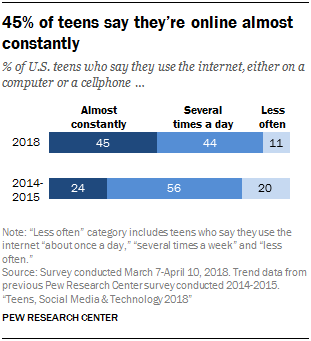And just when you thought that it couldn’t be more popular (or controversial), Facebook according to the Pew Research (Internet and Technology) is losing its foothold in this demographic to Youtube, Snapchat, and Instagram. The teens are speaking out and expressing their ambivalence over social media. Some say it makes them feel connected, others say that the “closeness” is superficial and that it encourages isolation, while others fear bullying and the pressure to go with whatever is popular at the moment.
In a prior Pew Research study in 2015, 71% of teens (12-17 years old) were still on Facebook. Today, that has dropped significantly to 51%. But why are American kids abandoning the ship and migrating to Youtube (used by 85% of teens), Instagram (72%), and Snapchat (69%). Coincidentally, these three more popular platforms are primarily “camera-based” platforms. Facebook is more popular among kids from lower income families: 70% came from those with incomes of $30,000 and lower. Those who patronized Facebook like the fact that it is easier to connect with friends and families from different age groups, find people with the same interests and ferret relevant news. But for those who don’t use Facebook or had reduced their exposure, some claimed that a lot of it had to do with parents “shutting down Facebook”. A disturbing finding is that over a quarter of users find bullying and spreading false rumors rampant on Facebook. One fifth complained that it actually destroyed relationships because of decreased interaction and led to some sort of digital”addiction”.
When asked which social media platform they used the most, only 10% chose Facebook while 35% chose Snapchat followed closely followed by 32% who preferred Youtube. Girls were more loyal to Snapchat while boys gravitated to Youtube more. The slide is so serious that E-Marketer predicts that ” Facebook would lose a further 2.1 million American users under the age of 25 this year”. With 95% of U.S. teens owning smartphones currently, that’s a huge number that can be lost through the cracks – advertising wise since 45% claim to be on the Internet constantly. The Pew Research also revealed 83% of girls play video games while 97% play video games; another reason why the quality and safety of games should be monitored.
“When the 17-year-old turned 13, getting a Facebook account was a rite of passage. Not long after she got the account she realised she didn’t have much use for it.” – Paul Verna (E-marketer analyst)
Personally, although ensuring privacy is now a battle cry at Facebook, the fact that they are playing “matchmaker’ soon is in some weird way, anti-teen and possibly could open a whole new can of worms. Perhaps if Facebook kept it more simple and not push its dendrites into all directions like battling Google on the “apps for business” end, Youtube for video and Match.com for pairings then it could focus on what had made it extremely popular in the first place. Some habits die hard and the older demographics are apparently still happy with the appeal of Facebook; but the downside is that tweens may skip Facebook together and flock to Snapchat and Instagram making the user population an aging one.

















